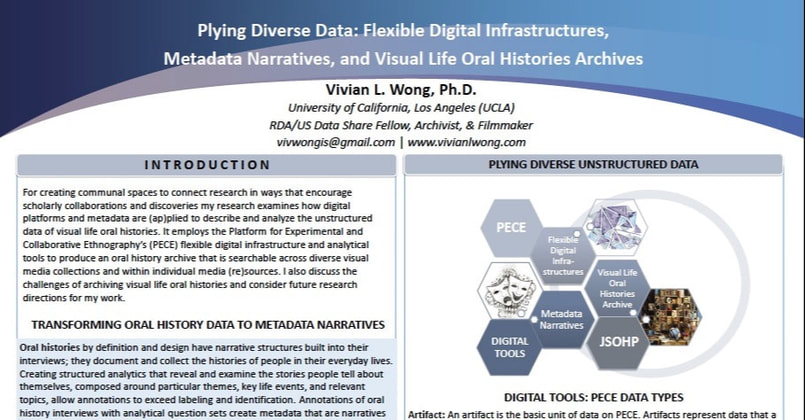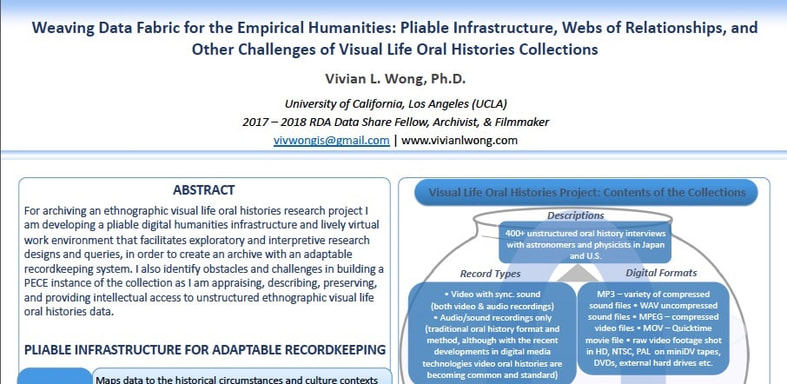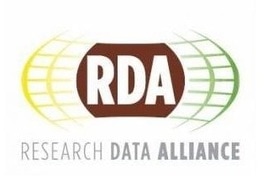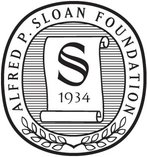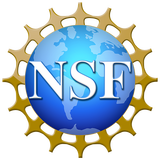weaving data fabric for the empirical humanities: flexible metadata, processual infrastructure, Meshwork, and other challenges
research data alliance 2018 plenary poster
| Plying Diverse Data Poster |
Research Data Alliance 2017 plenary poster
| Weaving Data Fabric Poster |
project description:
Given the increasing research interest in big data, large-scale data-driven collaborations, and collaborative research, new e-humanities and digital humanities infrastructures and virtual work environments must be continually explored and developed. How do we create and produce tools to seamlessly connect related research projects in complimentary, organic ways that compel collaborations in both the physical and virtual worlds where our collaborative projects are developed and executed? The proposed project, Weaving Data Fabric for the Empirical Humanities: Flexible Metadata, Processual Infrastructure, Meshwork, and Other Challenges , examines the kinds of exploratory research processes created as digital infrastructures that offer examples building, conducting, and maintaining multi-method, multi-sited historical and ethnographic research. It explores digital platforms to collect, preserve, access, and interpret oral life histories from several research projects conducted at different times and places, centering on minorities, women, and migrant (MWM) scientists, and of which I am a partner in a research team that includes anthropologists, historians, an archivist, and a special collections librarian. Combined these oral history projects have nearly 500 unstructured oral history interviews with astronomers and physicists in Japan and the U.S., conducted in Chinese, English, and Japanese. They include ephemera, ethnographic field notes, digital video and audio recordings, plus websites, reports, proposals, and publications––all presenting their own challenges when archiving and providing broad access to heterogeneous data and databases.
Conventional digital humanities projects make use of mapping and data mining as analytic tools to interpret, sort, and quantify data sets and research findings––data plots offering patterns upon patterns and maps upon maps are important visualization tools. However, more than extracting data with the tools for conventional mapping and mining, the Weaving Data Fabric project is interested in mapping and mining differently. It investigates forms of data mapping and mining that attend to the historical and cultural context in which the data is situated; therefore, data is not extracted devoid of the circumstances in which it was produced. Analytical tools need to be designed to facilitate the researchers’ exploratory, interpretative research processes and in order to preserve and share their data for potential re-use in future research, teaching, and professional outreach.
My project endeavors map research on research as ways of foregrounding the (research) process and facilitating it, such that it builds the digital infrastructures for our oral histories collections as pathways of designs and discoveries in conjunction with the kinds of research our team does. The pathways, which can be imagined as virtual chutes, ladders, and canals, produce overlapping meshworks (complex webs of relationships) for collaborations. It also works with PECE, because it provides an open source digital platform designed to support multi-sited, cross-scale ethnographic and historical research and collaborative hermeneutics through its virtual infrastructure. By partnering with PECE, my research enhances PECE’s digital infrastructures and devises new, alternate strategies and virtual avenues to foster the processual nature of iterative research, research queries, and research collaborations, which the Digital Practices in History and Ethnography Interest Group with whom I am participating is similarly invested. My work will assist the Empirical Humanities Metadata Working Group joint efforts with the Metadata Standards Catalog Working Group, contributing contextualized, humanities-based metadata practices and protocols that will facilitate connections between technologists and scholars in the humanities domain. It cultivates a common cartography through metadata standard catalogs that not only offers (virtual) systems interoperability, but also serves as models to guide interdisciplinary research collaborations; shared languages are created through which researchers can dialogue across disciplines and epistemological differences. Thus, my work will serve as templates for future research collaborations that use the PECE platform for their collective work.
Conventional digital humanities projects make use of mapping and data mining as analytic tools to interpret, sort, and quantify data sets and research findings––data plots offering patterns upon patterns and maps upon maps are important visualization tools. However, more than extracting data with the tools for conventional mapping and mining, the Weaving Data Fabric project is interested in mapping and mining differently. It investigates forms of data mapping and mining that attend to the historical and cultural context in which the data is situated; therefore, data is not extracted devoid of the circumstances in which it was produced. Analytical tools need to be designed to facilitate the researchers’ exploratory, interpretative research processes and in order to preserve and share their data for potential re-use in future research, teaching, and professional outreach.
My project endeavors map research on research as ways of foregrounding the (research) process and facilitating it, such that it builds the digital infrastructures for our oral histories collections as pathways of designs and discoveries in conjunction with the kinds of research our team does. The pathways, which can be imagined as virtual chutes, ladders, and canals, produce overlapping meshworks (complex webs of relationships) for collaborations. It also works with PECE, because it provides an open source digital platform designed to support multi-sited, cross-scale ethnographic and historical research and collaborative hermeneutics through its virtual infrastructure. By partnering with PECE, my research enhances PECE’s digital infrastructures and devises new, alternate strategies and virtual avenues to foster the processual nature of iterative research, research queries, and research collaborations, which the Digital Practices in History and Ethnography Interest Group with whom I am participating is similarly invested. My work will assist the Empirical Humanities Metadata Working Group joint efforts with the Metadata Standards Catalog Working Group, contributing contextualized, humanities-based metadata practices and protocols that will facilitate connections between technologists and scholars in the humanities domain. It cultivates a common cartography through metadata standard catalogs that not only offers (virtual) systems interoperability, but also serves as models to guide interdisciplinary research collaborations; shared languages are created through which researchers can dialogue across disciplines and epistemological differences. Thus, my work will serve as templates for future research collaborations that use the PECE platform for their collective work.
